Ditapis dengan

History of Western Philosophy and Theology, A
Outline: This book is the fruit of the author's forty-five years of teaching philosophical subjects...
- Edisi
- First Edition
- ISBN/ISSN
- 978-1-62995-084-6
- Deskripsi Fisik
- 875
- Judul Seri
- -
- No. Panggil
- 261.5'1 F84h
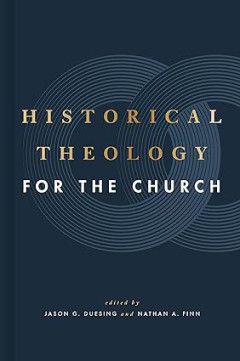
Historical Theology for the Church
Outline : In Historical Theology for the Church, editors Jason Duesing and Nathan Finn bring together top contributors to survey key doctrinal developments in every era of church history. They not only trace the development of various doctrines within historical congregations; they also provide a resource for contemporary congregations. Steered by the conviction that historical theology serves …
- Edisi
- -
- ISBN/ISSN
- 978-143364915-8
- Deskripsi Fisik
- 405 hal
- Judul Seri
- -
- No. Panggil
- 230 D869h

Biblical Theology According to the Aposles : How the earliest Christians told…
Outline : How did the apostles understand the Old Testament? Although relatively few in number, the New Testament's explicit summaries of the Old Testament story of Israel give readers direct access into the way the earliest Christians told this story―that is to say, into the way they did biblical theology. This stimulating New Studies in Biblical Theology volume examines the passages in the…
- Edisi
- First Edition
- ISBN/ISSN
- 978-0-8308-2020-7
- Deskripsi Fisik
- 230 hal
- Judul Seri
- New Studies in Biblical Theology 52
- No. Panggil
- 231.76 B8367b

Common Grace in Kuyper, Schilder, and Calvin : Exposition, Comparison and Eva…
- Edisi
- -
- ISBN/ISSN
- 978-0-9950659-2-5
- Deskripsi Fisik
- 429 hal
- Judul Seri
- -
- No. Panggil
- 234 D7478c
- Edisi
- -
- ISBN/ISSN
- 978-0-9950659-2-5
- Deskripsi Fisik
- 429 hal
- Judul Seri
- -
- No. Panggil
- 234 D7478c

Augustine and Nicene Theology Essays on Augustine and the Latin Argument for…
Outline: This book draws together a collection of thirteen published and unpublished articles which together constitute a new reading of the character and development of Latin Trinitarian theology in the fourth and fifth centuries. The focus of the essays is on Augustine of Hippo (354-430 CE), but Augustine is treated here as an inheritor of earlier Latin tradition. Many of the figures of that …
- Edisi
- -
- ISBN/ISSN
- 978-1-7252-9215-4
- Deskripsi Fisik
- 317 hal
- Judul Seri
- -
- No. Panggil
- 281.3 B2611a
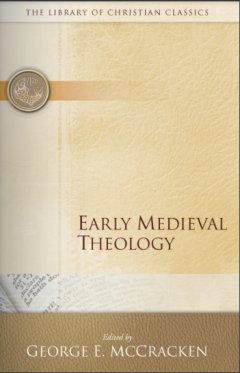
Early Medieval Theology
DARK AS THE SEVEN CENTURIES SPANNED BY THE selections in this volume are commonly supposed to have been, those who investigate them more than superficially will discover that in this period the church of Christ was ever endeavoring to lift aloft a light which the darkness did not overcome.
- Edisi
- -
- ISBN/ISSN
- 978-0-664-23083-8
- Deskripsi Fisik
- 430 p.
- Judul Seri
- -
- No. Panggil
- online
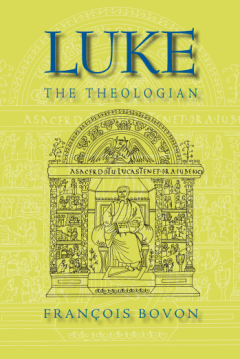
Luke the Theologian: Fifty-five Years of Research (1950-2005)
In this completely revised and updated edition, François Bovon provides a critical assessment of the last fifty-five years of scholarship on Luke-Acts. The study divides thematically, with individual chapters covering the subjects of history and eschatology, the role of the Old Testament, Christology, the Holy Spirit, conversion, and the church. Each chapter begins with a consideration of the…
- Edisi
- -
- ISBN/ISSN
- 1481314629
- Deskripsi Fisik
- 681 p.
- Judul Seri
- -
- No. Panggil
- online
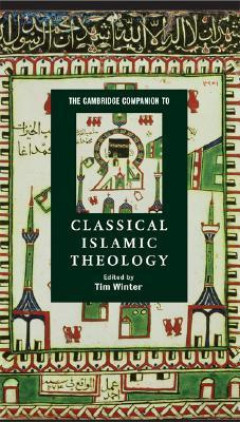
The Cambridge Companion to Classical Islamic Theology
This series of critical reflections on the evolution and major themes of pre-modern Muslim theology begins with the revelation of the Koran, and extends to the beginnings of modernity in the eighteenth century. The significance of Islamic theology reflects the immense importance of Islam in the history of monotheism, to which it has brought a unique approach and style, and a range of solutions …
- Edisi
- -
- ISBN/ISSN
- 9780521780582
- Deskripsi Fisik
- 352 p.
- Judul Seri
- -
- No. Panggil
- online
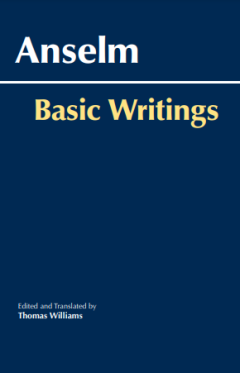
Anselm: Basic Writings
A collection of author's writings ranging from his early treatises, the "Monologion" (a work written to show his monks how to meditate on the divine essence) and the "Proslogion" (known for its advancement of the ontological argument for the existence of God), to his three philosophical dialogues on metaphysical topics.
- Edisi
- First Edition
- ISBN/ISSN
- 978-0-87220-895-7
- Deskripsi Fisik
- 448 p. ; 21.5 cm.
- Judul Seri
- -
- No. Panggil
- online

The Christian Tradition 4: reformation of church & dogma 1300-1700
This penultimate volume in Pelikan's acclaimed history of Christian doctrine—winner with Volume 3 of the Medieval Academy's prestigious Haskins Medal—encompasses the Reformation and the developments that led to it.
- Edisi
- First
- ISBN/ISSN
- 0226653765
- Deskripsi Fisik
- 479 p.
- Judul Seri
- -
- No. Panggil
- -

The Christian Tradition 3: the growth of medieval theology 600-1300
This book is based on a most meticulous examination of medieval authorities and the growth of medieval theology is essentially told in their own words. What is more important, however, then the astounding number of primary sources the author has consulted or his sovereign familiarity with modern studies on his subject, is his ability to discern form and direction in the bewildering growth of me…
- Edisi
- First
- ISBN/ISSN
- 0226653757
- Deskripsi Fisik
- 333 p. ; 24 c
- Judul Seri
- -
- No. Panggil
- -

Historical Theology: an introduction to the history if christian thought
"Freshly updated for this second edition with considerable new material, this authoritative introduction to the history of Christian theology covers its development from the beginnings of the Patristic period just decades after Jesus's ministry, through to contemporary theological trends. A substantially updated new edition of this popular textbook exploring the entire history of Christian thou…
- Edisi
- Second
- ISBN/ISSN
- 9780470672853
- Deskripsi Fisik
- 305 p. : map ; 26 cm
- Judul Seri
- -
- No. Panggil
- -

Suspended Middle, The : Henri de Lubac and the Renewed Split in Modern Cathol…
Outline: French Jesuit Henri de Lubac (1896 - 1991) was arguably the most revolutionary yet underacknowledged theologian of the twentieth century. He proposed that Western theology since the early modern period has lost sight of the key to intergrating faith and reason -- namely, the truth that all human beings are naturally oriented toward the supernatural. Originally published in 2005, The S…
- Edisi
- Second Edition
- ISBN/ISSN
- 978-0-8028-7236-4
- Deskripsi Fisik
- 120
- Judul Seri
- -
- No. Panggil
- 230\'.2092 M58s

Covenant and Election
- Edisi
- -
- ISBN/ISSN
- 0-921100-60-4
- Deskripsi Fisik
- 110
- Judul Seri
- -
- No. Panggil
- 231.76 G285c
- Edisi
- -
- ISBN/ISSN
- 0-921100-60-4
- Deskripsi Fisik
- 110
- Judul Seri
- -
- No. Panggil
- 231.76 G285c

Gospel of Justification in Christ, The : Where does the Church stand today?
Outline: On 31 October 1999, exactly 482 years after Martin Luther nailed his ninety-five theses to the church door in Wittenberg, the Roman Catholic Church and the Lutheran World Federation signed a historic joint declaration on the doctrine of justification. Recent agreements between Lutheran, Reformed, and Episcopal churches have expressed similar commitments. But what do these agreements…
- Edisi
- -
- ISBN/ISSN
- 978-0-8028-2690-9
- Deskripsi Fisik
- 182
- Judul Seri
- -
- No. Panggil
- 234\'.7 St954g

History of Western Philosophy and Theology, A
Outline: This book is the fruit of the author's forty-five years of teaching philosophical subjects. No other survey of the history of Western thought offers the same invigorating blend of expositional clarity, critical insight, and biblical wisdom. The supplemental study questions, bibliographies, links to audio lectures, quotes from influential thinkers, twenty appendices, and indexes glossar…
- Edisi
- First Edition
- ISBN/ISSN
- 978-1-62995-084-6
- Deskripsi Fisik
- 875
- Judul Seri
- -
- No. Panggil
- 261.5\'1 F84h

Christ Present in Faith: Luther's View of Justification
Outline: The author here opens up new interpretive questions for historical theology with striking implications for ecumenism, ethics, and spirituality. He writes, "the idea of the divine life in Christ which is present in faith lies at the very center of the theology of the Reformer." He argues that later Lutheran interpretation of this teaching has portrayed justification as more mechanical a…
- Edisi
- First Edition
- ISBN/ISSN
- 0-8006-3711-9
- Deskripsi Fisik
- 136
- Judul Seri
- -
- No. Panggil
- 234'.7'092 M316c

Oxford Handbook of Early Modern Theology, 1600 - 1800, The
Outline: This book offers a comprehensive and authoritative introduction to Christian theological writing in Western Europe from, roughly, the end of the French Wars of Religion (1598) to the Congress of Vienna (1815). Over the course of more than forty wide-ranging essays, employing a variety of approaches, the authors examine theology from Bellarmine to Johann Semler. They review the major …
- Edisi
- First Edition
- ISBN/ISSN
- 978-0-19-993794-3
- Deskripsi Fisik
- 668
- Judul Seri
- -
- No. Panggil
- 230.09 L528o

After Jonathan Edwards : The Courses of the New England Theology
Overview: Jonathan Edwards (1703 - 1758) is widely regarded as one of the major thinkers in the Christian tradition and an important and influential figure in American theology. This book is a collection of specially commissioned essays that track his intellectual legacies from the work of his immediate disciples who formed the New Divinity movement in colonial New England, to his impact upon …
- Edisi
- -
- ISBN/ISSN
- 978-0-19-975629-2
- Deskripsi Fisik
- 339
- Judul Seri
- -
- No. Panggil
- 230'.5874 C868a

Early Christian Thinkers : The Lives and Legacies of Twelve Key Figures
Early Christian thinkers introduces the lives and works of twelve key Christians from the second and third centuries--a pivotal early moment in the history of orthodox doctrine. Each chapter includes a biographical and historical overview of the thinker, a detailed survey of his or her major writings and ideas, an in-depth discussion of each thinker's influence on the formation of the tradition…
- Edisi
- -
- ISBN/ISSN
- 9780830839377
- Deskripsi Fisik
- 203
- Judul Seri
- -
- No. Panggil
- 230.0922 F811e
 Karya Umum
Karya Umum  Filsafat
Filsafat  Agama
Agama  Ilmu-ilmu Sosial
Ilmu-ilmu Sosial  Bahasa
Bahasa  Ilmu-ilmu Murni
Ilmu-ilmu Murni  Ilmu-ilmu Terapan
Ilmu-ilmu Terapan  Kesenian, Hiburan, dan Olahraga
Kesenian, Hiburan, dan Olahraga  Kesusastraan
Kesusastraan  Geografi dan Sejarah
Geografi dan Sejarah